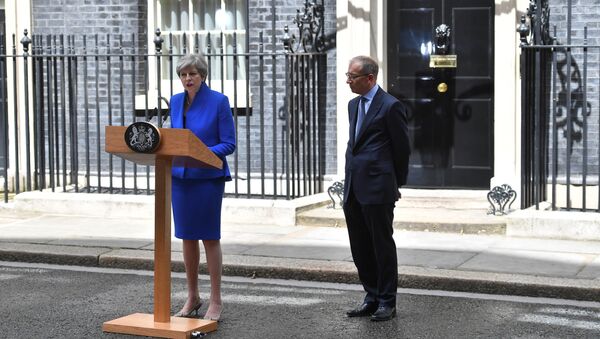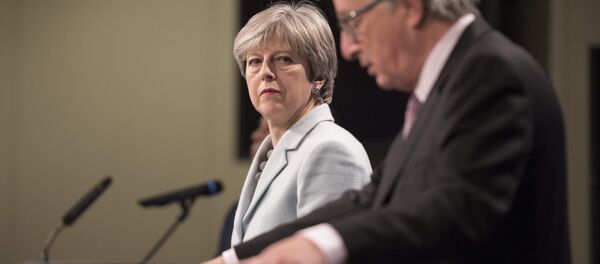Johnson resigned earlier on Monday, less than a day after the departure of Brexit Minister David Davis. Davis' resignation over disagreements with UK Prime Minister Theresa May's plan for exiting the European Union was followed by that of a junior minister in the UK government's Brexit department, Steve Baker.
Crisis for Tories
On Friday, the UK Cabinet released an outline of their position on the country’s future relationship with the European Union after Brexit, after a meeting at Chequers. The published document outlined such proposals as a joint institutional framework to be set up to interpret EU-UK agreements, a treaty to be signed on the United Kingdom's continued harmonization with EU rules, and a combined customs territory to be created between the United Kingdom and the European Union.
In Davis’ resignation letter, the former minister cited disagreements with May over her Brexit plan as the reason for stepping down.
Margot Parker, a member of the European Parliament for the UK Independence Party (UKIP), said that the resignations of Davis, Johnson and Baker would have all been motivated by their lack of faith in May’s Brexit plan.
"[The resignations] show they had no faith in the Prime Minister’s plans put forward on Friday. Theresa May clearly will not deliver the Brexit they wanted," Parker said.
Shahrar Ali, a candidate for Green Party leadership, stated that the resignation of Davis was also representative of a wider sentiment of distrust in the Conservative leadership by the party.
"David Davis said he resigned because he would have had to champion a Brexit policy at home and abroad that he didn’t believe in. The reality is that nobody in the country, no matter on which side of the referendum, believes in May’s Chequers summit – except May herself," Ali said.
Earlier in July, May said her Cabinet had agreed a deal on the basis of UK ties with the European Union after Brexit. A white paper outlining their common stance is expected to be published this week.
READ MORE: UK Media Speculates About Possible No-Confidence Vote for Theresa May
The white paper, May said, will propose an EU-UK free trade area for industrial and agricultural goods, as well as a common customs territory, putting the cabinet on a collision course with many hardline Brexiteers among the ruling Conservatives. The UK government previously was inclined to establish a full-fledged customs union with the bloc without any exceptions and with the application of WTO tariffs.
Lord Alfred Dubs of the Labour Party said that the resignations were a crisis for the government that would affect its unity.
"[The resignations are] very bad for Britain and for the government to have that self-crisis and it is very bad that the government is not being able to speak with the single voice in Brussels," Dubs said.
John Petley, the spokesman of the Campaign for an Independent Britain, stated that if May were to handle the resignations poorly, then it could result in the Conservative Party losing power.
"The thing with Mrs. May is that she's been a lifelong Tory and is very committed to the party. But really if she messes this up it's going to be the crisis for her party that will be compared to the crisis following the repeal of the Corn-laws in 1846, you know it put them out of office effectively for twenty-eight years," Petley said.
Leadership Challenge on the Horizon
A leadership election could be triggered with the support of 48 Conservative members of parliament. On Monday, a Downing Street spokesperson told reporters that May would defend her position as prime minister if a leadership election was called.
Janice Atkinson, an independent member of the European Parliament for the United Kingdom, stated that Conservative Party members were no longer supportive of May, or her choices for government positions and would be looking for another leader of the party.
"The Conservative members detest May and want her gone, to be replaced by a Brexit supporting PM. To have degraded Davis as she did, replacing him with a Remain civil servant and her chief of staff who hates Brexiteers, has shown May as weak. After the general election, her two advisers were kicked out after terrible advice. We now have two arch Remainers, Barwell and Robbins, who must also now go for undermining senior cabinet members who colluded with Brussels," Atkinson said.
Davis, in an interview with the BBC4 broadcaster on Monday, said that May would survive in power after his resignation, and that he would not seek to run for leadership of the Conservative Party.
READ MORE: Eurosceptic Group: UK Resignation Crisis May Prompt Rethink Brexit Strategies
Gerard Batten, a member of the European Parliament for UKIP, said that Johnson’s resignation would have been motivated by the prospect of prompting a leadership election in which he could stand.
"Boris thinks Mrs. May is on the run and that there will be a leadership election. Boris is only interested in Boris and thinks it's his chance to be Prime Minister. If he succeeds will he be better than Mrs. May? Well, he certainly couldn't be worse," Batten said.
Robert Griffiths, the General Secretary of the Communist Party of Britain, stated that if a leadership election was called, it could provoke even further crisis within the Conservative Party.
"It's quite possible there would be a leadership challenge although I doubt if the real Leavers would get a majority. This would plunge the Tory party in Parliament into an almost terminal crisis," Griffiths said.
Change for Brexit
Last March, May officially invoked Article 50 of the Lisbon Treaty, launching the process of the country's withdrawal from the bloc. The Brexit negotiations between London and the European Union started last year and are due to be completed by the end of March 2019.
READ MORE: UK PM May Will Fight Any Attempt to Oust Her as Leader — Spokesman
Atkinson stated that the resignations of Davis and Johnson could not only simply show a lack of support for the current Brexit process, but could be a matter of principle.
"First Davis, now Boris — is this an outbreak of political principle at last on the issue of Brexit? Let us hope so. Brexit is the most important democratic issue of our time, more people voted in the referendum than any other. Her mandate was clear. May degrades it at her peril. Politicians must stand up for it, or face the public's wrath," Atkinson said.
Batten stated that a majority of people in the Conservative party were disapproving of the soft Brexit pursued by May, as it concerns the EU single market, the customs union and UK sovereignty.
CIB's Petley noted that although the crisis in government was a significant challenge, it could be the necessary push to force a change of direction on Brexit.
"Now it's becoming very serious and to be honest I think it could be for the good. It could be the catalyst that's needed to force a change of direction," Petley said, adding that what the leadership challenge meant for Brexit was likely that the United Kingdom would either stop the Brexit process or consider joining the intergovernmental European Free Trade Association.
President of the European Council Donald Tusk stated on Monday on his official Twitter that he regretted that the departure of Johnson and Davis did not prompt the United Kingdom to reconsider its withdrawal from the European Union.
Politicians come and go but the problems they have created for people remain. I can only regret that the idea of #Brexit has not left with Davis and Johnson. But…who knows?
— Donald Tusk (@eucopresident) July 9, 2018
Griffiths stated that the Labour Party could take control of the Brexit negotiations and steer them into another direction by forcing an early general election.
"As far as the Communist Party is concerned what we'd like to see is the Labour Party take every opportunity now to force an early general election… so that a left-led Labour Party could take over the Brexit process and negotiate a real, people's Brexit … that would mean not being subject to the big business freedoms of the single market and customs union," Griffiths said.
The United Kingdom voted to leave the European Union in a referendum in 2016, but the vote left the country divided almost equally into "Remainers" and "Brexiteers." The model for a future economic partnership, and the issue of the border between the Republic of Ireland and Northern Ireland have proved to be the most contentious matters both in the talks with Brussels and the debates within the UK cabinet, which led to high-profile resignations.
The views and opinions expressed by the speakers do not necessarily reflect those of Sputnik.


